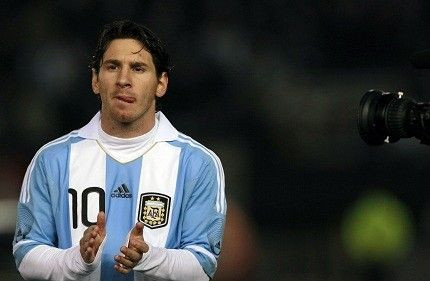Copa America 2011: Why Lionel Messi Has Struggled With Argentina

The unthinkable is happening to Argentina.
Playing on their home soil, they are winless after two games, and will need a victory over Costa Rica to secure a spot in the knockout round of the Copa America.
A proud soccer country, Argentina is accustomed to winning, yet hasn't made the Finals of the World Cup since 1990 -- and hasn't won a Copa America since 1993.
It would basically be impossible to ignore the role Barcelona superstar Lionel Messi plays in Argentina's failure in recent years. Though Argentina's shortcomings are a group effort, and Messi is obviously an easy target, there has to be some blame pointed at a forward who has been a scoring machine in club matches but a dud on the international scene.
Arguably the world's best player, Messi struggled to score in the 2010 World Cup, and has been inefficient in his few opportunities in Argentina's two Copa America games. He has been called out on many occasions to step up when it counts, but he simply has underachieved.
There are some key reasons why Messi is so much better for Barcelona than he is for Argentina.
Midfield Play. The Catalans have two very effective distributors in Andres Iniesta and Xavi, who have a knack for finding forwards in goal-scoring situations. Messi has certainly benefited from their exceptional passing and dribbling skills, and they have set him up for great opportunities to go one-on-one with defenders. Meanwhile, Argentina has lacked a quality central midfielder for years, and it shows in the lack of chances Messi and other Argentine forwards have to get good looks at the goal. Things were so bad for 2010 Argentina World Cup head coach Diego Maradona that he had to rely on past-his-prime attacking midfielder Juan Veron to be the set up man.
Style of Play. No club in the world plays with such fluidity than Barcelona. Pep Guardiola's squad are all on the same page, as they efficiently pass to one another with such precise timing that opponents become frustrated and result to fouling or being lulled into mistakes. The Barcelona system is perfect for Messi, who gets touches often with the intention of creating his own shot. Argentina, on the other hand, has struggled to find the same rhythm they enjoyed in the 1970s and in the Maradona era. Perhaps due to a squad that plays multiple club styles and not one uniform strategy, it's rare to see an Argentina team play with excellent chemistry, and this hurts the ability to find forwards like Messi.
Forward Play. Gonzalo Higuain and Carlos Tevez are world class forwards, but in games where the tandem has played with Messi, they seem to give uneven performances. There appears to be a lack of cohesion, and failure to understand the strengths and weaknesses of their teammates that leads to ineffective shots on goal. At Camp Nou, Messi may have the ideal duo along side him in Pedro and David Villa. The three attackers have a strong awareness of where the others are on the field, and they play to their teammates strengths.
The Lionel Messi Experiment in Argentina proceeds despite poor results, but Argentina has no other recourse than to trust Messi to break out of his slump and find a way to overcome his obstacles and produce like the superstar player he has proven to be with Barcelona.
The upcoming match against a makeshift Costa Rica squad will be yet another chance for Messi to show he can deliver with the pressure on him.
© Copyright IBTimes 2024. All rights reserved.






















